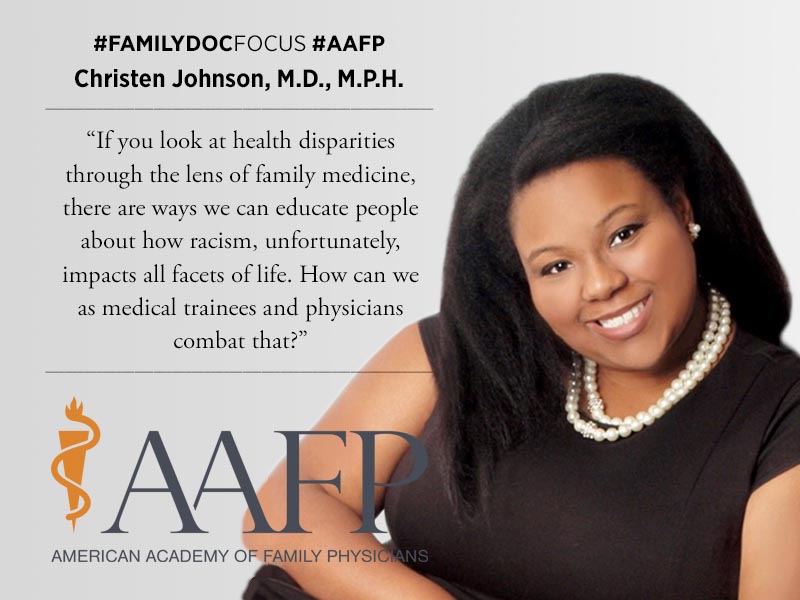AAFP Fellow Aims for Major Impact on Health Equity
February 15, 2021, 12:00 pm David Mitchell — Christen Johnson, M.D., M.P.H., created a resident-led health equity leadership concentration at Ohio State’s Family Medicine Residency program that led to statistically significant increases in physician self-efficacy regarding caring for vulnerable populations.

Now Johnson, who spent a year researching for that project and another year implementing it, wants to do more.
“It scratched the surface, and I think the basis of it is helpful,” said Johnson, who was born and raised in Columbus, Ohio, and started practice at a federally qualified health center in her hometown after graduating last year. “It had a lot of the pieces of the puzzle necessary to inspire trainees to think deeply about health equity, but it was directed specifically at the residency program.”
As an AAFP Health Equity Fellow, Johnson’s new yearlong project aims to develop a curriculum that could reach a broader audience. It will cover issues such as advocacy, social determinants of health and cultural humility from a critical race theory lens.
“If you look at health disparities through the lens of family medicine, there are ways we can educate people about how racism, unfortunately, impacts all facets of life. How can we as medical trainees and physicians combat that?” Johnson said. “My hope is that this curriculum can be used by residency programs, clerkship groups and practices.”
While she was a student at Wright State University’s Boonshoft School of Medicine in Dayton, Ohio, Johnson also earned a Master’s in public health. Her thesis reviewed the effects of hypersegregation on health disparities.
“That experience gave me a better idea of the true impact of the social determinants of health and what patients go through,” she said. “Our medical schools and residency programs attempt to get this information in, but we can do more. This is a passion project for me.”
Johnson recently was named a Cobb Scholar. That program provides mentoring and support in career advancement for individuals who aspire to become physician leaders and academicians with an interest in health disparities and health inequities. At the FQHC where she works, most patients either are covered by Medicaid or are uninsured. Forty percent of patients need interpretation services. Despite the challenges, Johnson said she loves the work she does with this population.
She serves on the Ohio AFP’s public policy committee and recently completed a term on the AAFP’s Commission on the Health of the Public and Science. Johnson also has held numerous leadership positions with the Student National Medical Association, including president.
During her year as president, she led a national advocacy campaign that included the creation of an education manual and a health policy fellowship with related webinars and seminars.
“That was an incredible blessing and opportunity that has shaped my career,” she said. “I was learning from some of the best and brightest minds in medicine and public health, and I learned about implementing programs at the national level and serving on a national board.”
Johnson plans to continue her education beyond her current fellowship. In January she started work on a doctorate of education.
“I want to impact the way we teach things like cultural humility, health equity, and the way we approach diversity and inclusion policy in medical education,” Johnson said.
She already is mentoring medical students though a program with Wright State’s SNMA chapter.
“You can’t expect to make a big change if you’re not actively working to make sure the next generation of physicians has the arsenal of tools they need,” she said.
That includes providing role models from diverse backgrounds.
“It’s important to have someone you can identify with who came before you,” said Johnson, who currently serves as co-chair of the National Medical Association’s postgraduate section. “I take it as a personal assignment to do as much mentoring as I can and take part in education as much as I can.”
Johnson said she was fortunate to have a memorable experience with a Black woman physician at an urgent care as a 3-year-old patient with an ear infection.
“She walked me around, let me play with her stethoscope and look through an otoscope to calm me down,” Johnson said. “I got a couple extra stickers because I was good.”
On the ride home, Johnson told her mother she wanted to be like that doctor when she grew up.
“That started my love of science and interest in medicine,” she said. “I didn’t choose to be a doctor. Medicine chose me through divine intervention. It’s something I have been working toward since I was 3. I love serving my community and this is the perfect way to do so.”